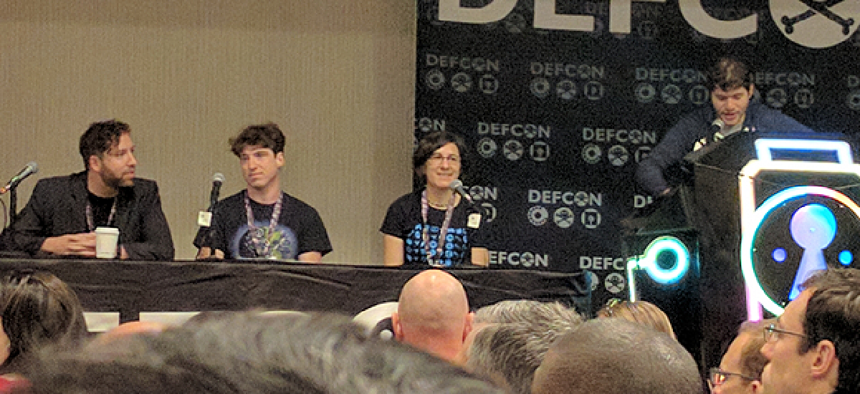Connecting state and local government leaders
The policyspeak of a DEF CON "Meet the Feds" panel put some hackers to sleep, but one attendee was glad to learn of the government’s work on IoT and software security.
For years, attendees at the annual DEF CON hacker conference have played "spot the fed." That wasn't terribly difficult this year, however -- a Meet the Feds panel was part of the official program, featuring agency tech execs talking about current projects and where they need help from the hacker community. What follows is one attendee’s take on those outreach efforts.
A 45-minute panel at the recent DEF CON hacker conference called “Meet the Feds” featured some big names (with big titles!) in government tech policy: Allan Friedman, director of Cybersecurity Initiatives at the National Telecommunications and Information Administration; Jonathan Mayer, chief technologist, Enforcement Bureau, Federal Communications Commission; Lorrie Cranor, chief technologist at the Federal Trade Commission; and Edward Felten, deputy United States CTO who works out of the White House Office of Science and Technology Policy. During their panel, anyone from the crowd could ask unscripted questions. The premise of this session got me excited, as I’m always curious about the federal government’s involvement in technology.
Before answering questions, the feds -- a group of nerds under 40 -- updated us on what each department is focusing on right now. The transparency was nice to see.
The Federal Trade Commission is focusing on protecting consumers, stopping communication leaks and breaches and eliminating spam fraud and robo calls. 18F, the government’s digital services shop, is a couple hundred engineers, usability experts and attorneys working to improve government’s technology services by embracing the cloud and baking in security up front. The FCC is policing companies like Verizon/AT&T and working on keeping the internet free by enforcing net neutrality policies.
It’s good to know that our government, “the largest organization mankind has ever experienced,” as NTIA’s Jonathan Mayer calls it, is staying on top of technology. I also appreciate the fact that these large scary titles are owned by younger people with whom I could grab a beer.
Come time for questions, however, the big titles had little to offer. There were seven questions asked, but most of the 45 minutes on were spent on just two: “How do I pursue a career in the government?” and “How can we be better heard in [the FCC’s forum that] calls for comments?” Other, more technical or prying questions were dodged, which was disheartening. However, a few gems came out of the answers.
The first gem is important knowledge for all U.S. citizens. The government is now seriously looking at Internet of Things security. This validates the IoT movement 100 percent; only five years ago, people treated it with skepticism, like they did global warming. The feds are actively working on education in the IoT arena, which makes me feel safer knowing connected devices like cars, traffic lights and water systems, for example, are and will be getting more government attention and regulation.
The second gem was their response on taking advantage of the FCC's Electronic Comment Filing System, which was launched in June. The question asked was, “The call for comments forum is dominated by corporate entities. How can citizens make a bigger impact?” Panelists responded with some solid advice: When commenting, make sure you do not write an implicative comment. Second, when writing a comment, provide constructive input backed by data. Third, make sure you file comments in the right docket. Duh, right, but the panelists said a large number of comments are misfiled and so completely ignored. This is great feedback for those leveraging the new commenting system. A once-broken system now has promise because technology is pushing it in the right direction. There is hope for our generation after all.
The third gem happened off-panel with the NTIA's Friedman. The feds offered a private Q&A outside of the speaking room for all the questions they did not get to answer. I asked Friedman if the government has considered creating guidelines for software modeled after current architectural and building regulations required for skyscrapers and building construction. So, just as buildings can be LEED-certified, software subscriptions could be XYZ-certified. It would ensure buyer and security confidence, but it would also make software harder to develop, making it tough for companies to break into the market. It’s a double-edged sword, but ultimately, buildings are safer today because of certifications, and software could eventually gain these same benefits.
Allan said yes, they are exploring it now and using the building standards as a basis. That is a big deal; when that is released or enforced, it will change the software market forever.
To wrap it up, they talked about policy so much that it nearly put me to sleep (the partying until 3:00 a.m. didn’t help either). In any case, the panelists are all basically comp sci students who moved into regulation and became attorneys with technology titles (some of them admitted to this), but that doesn’t make them any less awesome! The energy they brought was great, and I thank them for their openness. It was great to see them nerding-out with the rest of us when I imagine saying the wrong thing publicly could earn them a demotion, or worse.
Even though the hacking culture’s emphasis on instant results is the complete opposite of government’s slow and deliberate pace, I feel these patches will hold us over until it’s time for a major reboot.
NEXT STORY: Turning cybersecurity inside out



